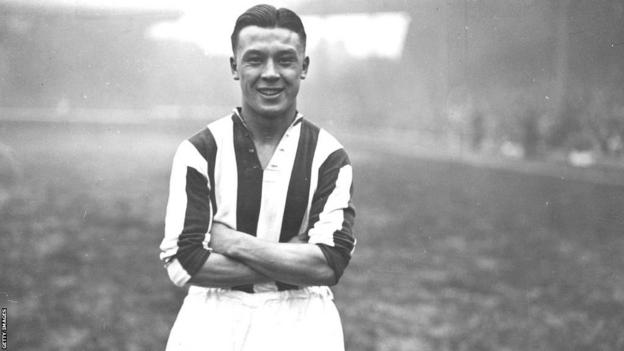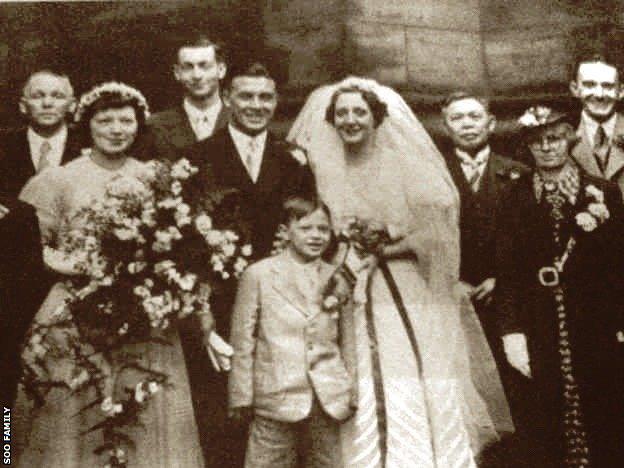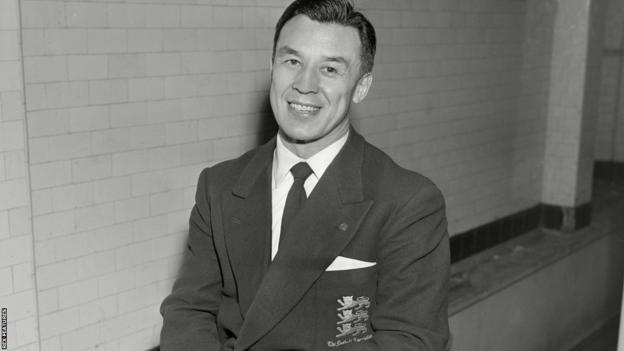
Sign up for notifications to the latest Insight features via the BBC Sport app and find the most recent in the series.
The voice of BBC commentator Raymond Glendenning crackles out of the radio.
"And this time a neat backpass by Soo finds Matthews..."
The date is 20 October 1945. World War Two has only been over for a month. As people across England crowd around their radios, they can hear 54,000 fans roaring on their team against Wales at the Hawthorns.
Nearly 80 years on, while Stanley Matthews remains one of English football's most enduring names, Frank Soo is a relative unknown.
Yet Soo's story, one of adversity, celebrity and then obscurity, is significant. And slowly being recognised once more.

Three years earlier - on 9 May 1942 - a 28-year-old Soo played his first game for England, also against Wales, in front of 30,000 people at Cardiff's Ninian Park.
It was a historic debut. Soo became the first non-white man to play for England. He was already the first Chinese player in the English Football League. And he remains the only player of Asian descent to represent England at senior level.
In the 1930s Soo was a star. A household name who appeared on cigarette cards and featured in newspapers, he was described as a talented half-back, clever, quick with an eye for an incisive pass and able to play in any position.
England team-mate Stan Mortensen summed up Soo's style. "Everything he did was hall-marked," wrote Mortensen in his book Football is My Game. "He seemed incapable of a clumsy movement."
But Soo's fame faded in the following decades. To the vast majority of fans, his name is unknown.

Soo spent the majority of his club career at Stoke City
Soo was born in 1914 in Buxton, Derbyshire, a few months before the start of the First World War.
His mother Beatrice was English and his father Quan was Chinese. They met in the Manchester area and, at the time of their marriage, were registered as living at the same address.
In the 1911 census there were only 1,319 China-born citizens residing in England and Wales in a population of about 35 million. The main source of income for many Chinese immigrants, including Quan, was running steam laundries, a quintessential working-class job for many settlers.
Laundry work was traditionally performed by women, so the Chinese community faced less hostility because they were seen as taking women's jobs rather than men's.
Even so, Chinese workers were caught in an impossible situation. If they did work, they were accused of stealing local jobs. If they did not, they were deemed idle.
Women who married immigrants automatically lost their British nationality and became foreigners.
The hostility they faced would occasionally turn into social unrest. The first Chinese laundry in London was stoned soon after it opened
in 1901. During the 1911 Cardiff riots all 30 Chinese laundries in the city were targeted.
Quan and Beatrice moved to Buxton and, after spells in different areas, had settled in West Derby in Liverpool by 1920, running a popular laundry on Town Row.
Soo's footballing abilities were clear from a young age and he joined Prescot Cables as an 18-year-old in 1932. Although he was scouted by Liverpool and Everton, Stoke City declared their interest and manager Tom Mather signed him for £400 in 1933.
Promoted to the top flight in Soo's first season, Stoke were a thrilling and elegant side, with Soo dovetailing with the legendary Matthews.
By 1938, a 24-year-old Soo was Stoke captain, and the demands of fans and journalists for him to be called up by England were increasing.
The outbreak of war delayed his promotion to the international stage before he made his debut in 1942.
Soo played 260 matches for Stoke between 1933 and 1945, including wartime friendlies and cup games, scoring 20 goals in the process.
He also became a national icon. His wedding with his first wife, Beryl Lunt, made headlines
in the Staffordshire Sentinel in 1938 after attracting a crowd of 2,000 of well-wishers despite attempts to keep the ceremony a secret.

Soo and Beryl Lunt pose after their 1938 wedding with Soo's parents Quan and Beatrice to the right of the bride
The article also revealed that the honeymoon would be spent in Bournemouth. The media rarely published details about footballers' personal lives, but Soo's stardom caused this excitement.
His Chinese heritage was part of the intrigue.
"It was regarded as a novelty," said Susan Gardiner, author of The Wanderer: The Story of Frank Soo.
"They were intrigued by the fact that this very young, talented Chinese player had joined Stoke City... rather than [being] hostile towards him."
Nevertheless, Soo had to deal with regular references to his race and his name being used in disrespectful pun-filled headlines.
Ronnie Soo, Frank's nephew, said in the documentary Frank Soo: The Forgotten Legend
that there were "cartoons of him as a Chinese character with a football at his feet".
Generally, Soo received positive coverage and, seen grinning in photographs of the time, it is easy to understand why he was referred to as 'The Smiler'.
Soo served in the Royal Air Force in World War Two but continued to play club football after the Football Association suspended the Football League and organised regional Wartime Leagues. He also captained the Royal Air Force and Forces XI.
Soo played nine games for England, including a 3-2 win over Scotland in front of 133,000 fans at Hampden Park in 1944.
However, because he only played during the war and games were deemed unofficial by the FA, those appearances were never recognised with caps.
The usual club competitions were suspended at the outbreak of war and the practicalities of conflict affected international games.
"Players in the services or civilian work could only play if it did not interfere with their military service or war work," said Dr Alexander Jackson, curator at the National Football Museum and author of Football's Great War.
"While the FA encouraged good relations with the armed forces and the release of service players for international games, due to their value in raising morale and raising funds for charity, it could not compel the forces to release a player.
"The deployment of military personal abroad, and the loss of players through military service, meant that the FA was restricted in who it could select.
"The war would have placed obstacles in the way of FA selectors observing players and recommending them for international honours in the same way as in peacetime."
Soo was 25 when war broke out, the peak of many playing careers. By the time the war was over, he was 31.
He still came close to making his England career official. Called up for another peacetime England international in 1946, Soo pulled out with an ankle injury and was replaced by bright young star Billy Wright.
Wright, a future England captain, won his first official cap against Ireland eight months later, supplanting Soo in the team and ensuring his international career would never be officially recognised.

Soo's managerial career included two year-long stints with St Albans City and (above) Scunthorpe
After short spells playing for Leicester City, Luton Town and Chelmsford City, Soo moved into management.
It took him abroad in 1952 and his memory faded from English football.
His reputation was reinforced overseas as he led Norway to the 1952 Olympics and won the Swedish top flight with Djurgardens IF in 1955.
Following his final recorded managerial role with Danish side Akademisk Boldklub in 1965-66, very little is known about Soo. It is suggested that he moved back to north-west England in the mid-1970s before settling in Stoke.
Fans recall seeing him at local matches, showing them cigarette cards from his glory days.
"When he was back in England, he was suffering from what's now known as Alzheimer's," said Ronnie. "He was in care but in later years he did deteriorate."
Soo died of dementia on 25 January 1991 in Staffordshire.
His ethnicity, his move abroad, the impact of the war and the relatively sparse media coverage of football in his playing heyday contributed to Soo's relative anonymity, but much has been done over the past decade to celebrate his achievements.
In 2016 Gardiner's book pieced together local history, family records and newspapers archives to produce the most comprehensive record yet of Soo's story.
A year later, coach and community champion Alan Lau, having read the book, founded the Frank Soo Foundation to promote Soo's story.
In 2020 the foundation worked with Google to feature Soo as the search engine's 'Doodle'
, putting his likeness in front of millions of web browsers worldwide.
This month he was inducted into Stoke's Sporting Hall of Fame, marked by a half-time commemoration at the Bet365 Stadium.
Across town, on the site of Stoke's former Victoria Ground home, there is Frank Soo Street named in honour of a club legend.
There is scope for further commemoration.
In March Jack Leslie was awarded a posthumous cap by the FA. Leslie was the first black player to receive an England call-up in 1925, but his invite to play for his country was withdrawn when, his family believe, selectors realised the colour of his skin.
Soo, and the Asian heritage players that have followed in his wake, still await a breakthrough England cap.
Li Ke, who was known as Nico Yennaris during his time growing up in London and playing for Arsenal, Brentford and England's age-group sides, in 2019 became the first naturalised player to represent China.
Jiang Guantai, known as Tyias Browning while playing for Everton, Sunderland and England Under-21s, is now a regular for China.
In the women's game, Aston Villa's Maz Pacheco has said she is undecided over whether to play for the Philippines or England.
Before them all came Soo - a pioneer for non-white representation in English football, a Stoke City icon and a successful manager who overcame adversity in life and is emerging from anonymity in death.